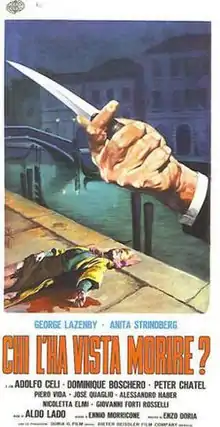Who Saw Her Die?
Who Saw Her Die? (Italian: Chi l'ha vista morire?) is a 1972 Italian giallo film directed by Aldo Lado and Vittorio De Sisti, starring Anita Strindberg and George Lazenby. Lazenby and Strindberg play the parents of a murdered girl, who pursue her black-veiled killer throughout Venice. Who Saw Her Die? features music by Ennio Morricone, and has seen positive reviews for Lazenby's performance.
| Who Saw Her Die? | |
|---|---|
 Italian film poster | |
| Directed by | Aldo Lado |
| Screenplay by |
|
| Story by |
|
| Produced by |
|
| Starring |
|
| Cinematography | Franco Di Giacomo |
| Edited by |
|
| Music by | Ennio Morricone |
Production companies |
|
| Distributed by | Overseas Film Company |
Release date | 12 May 1972 |
| Countries |
|
Plot
In a French ski resort, a young girl wanders off from her carer and is murdered by a killer in a black veil, who buries her body in the snow. Years later, another young girl, Roberta Serpieri, is found drowned in Venice after being abducted by the same killer. Her divorced parents, sculptor Franco and Elizabeth, attempt to discover what has happened to their daughter.[1][2]
Cast
- George Lazenby as Franco Serpieri
- Anita Strindberg as Elizabeth Serpieri
- Adolfo Celi as Serafian
- Dominique Boschero as Ginevra Storelli
- Peter Chatel as Philip Vernon
- Piero Vida as Journalist
- Jose Quaglio as Bonaluti
- Alessandro Haber as Father James
- Nicoletta Elmi as Roberta Serpieri
- Rosemarie Lindt as Gabriella
- Giovanni Forti Rosselli as Francois Roussel
- Sandro Grinfan as Inspector De Donati
Production
Who Saw Her Die? was written by Massimo D'Avack, Francesco Barilli, Aldo Lado and Rüdiger von Spiehs; it was directed by Lado and Vittorio De Sisti.[3] The film's music was composed by Ennio Morricone, whose score was released separately in 1972.[4]
The film was shot on location in Venice; one of the film's chase scenes was filmed at the Molino Stucky flour mill, a run-down building which was later renovated as a Hilton hotel in 2008.[5]
In both the Italian and English versions, Lazenby's voice is dubbed by other actors.[6] Italian films were rarely shot with usable sound and dubbed in post-production.[7] For the English version, Lazenby was dubbed by American actor Michael Forest.[8]
Release and reception
Who Saw Her Die? was also distributed under the title of The Child.[3]
In his book Italian Horror Film Directors, Louis Paul has described Lazenby's performance as one of the actor's best, although he regretted that some dubs of the film did not use Lazenby's voice.[9] Danny Shipka, author of Perverse Titillation, compared the film stylistically to Nicolas Roeg's film from the following year, Don't Look Now, which shares a Venetian setting. Shipka noted that Lado avoided the explicit gore and sexual elements usually present in a giallo film, instead focussing on "an aura of uneasiness".[1] Buzz McClain of AllMovie awarded Who Saw Her Die? three-and-a-half stars out of five, highlighting Lazenby's performance and Morricone's score; McClain felt that the film's plot was unnecessarily complicated, but that this was compensated for by its setting and cinematography.[2]
Footnotes
- Shipka 2011, p. 110.
- McClain, Buzz. "Who Saw Her Die? (1972) – Aldo Lado". AllMovie. Archived from the original on 29 September 2022. Retrieved 4 May 2016.
- "Chi l'ha vista morire? (1972)". British Film Institute. Archived from the original on 2 September 2023. Retrieved 4 May 2016.
- "Chi l'ha vista morire? (Colonna sonora originale) – Ennio Morricone". AllMusic. Archived from the original on 2 September 2023. Retrieved 4 May 2016.
- Pigott 2013, p. 46.
- "Classic Horror on Disc: Arrow's Who Saw Her Die? (1972) - Diabolique Magazine". Archived from the original on 19 May 2023. Retrieved 11 April 2020.
- "Blasts from the Past! Blu-ray Review: WHO SAW HER DIE? (1972)". 16 September 2019. Archived from the original on 19 May 2023. Retrieved 11 April 2020.
- "Blu-ray Review: Who Saw Her Die? | Inside Pulse". Archived from the original on 19 May 2023. Retrieved 11 April 2020.
- Paul 2005, pp. 288–289.
References
- Paul, Louis (2005). Italian Horror Film Directors. McFarland & Company. ISBN 9780786487493.
- Pigott, Michael (2013). World Film Locations: Venice. Intellect Books. ISBN 978-1841507200.
- Shipka, Danny (2011). Perverse Titillation: The Exploitation Cinema of Italy, Spain and France, 1960–1980 (illustrated ed.). McFarland & Company. ISBN 978-0786448883.